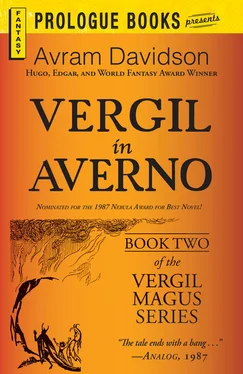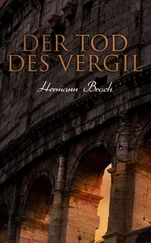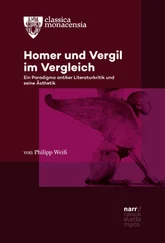Avram Davidson - Vergil in Averno
Здесь есть возможность читать онлайн «Avram Davidson - Vergil in Averno» весь текст электронной книги совершенно бесплатно (целиком полную версию без сокращений). В некоторых случаях можно слушать аудио, скачать через торрент в формате fb2 и присутствует краткое содержание. Жанр: Фэнтези, на английском языке. Описание произведения, (предисловие) а так же отзывы посетителей доступны на портале библиотеки ЛибКат.
- Название:Vergil in Averno
- Автор:
- Жанр:
- Год:неизвестен
- ISBN:нет данных
- Рейтинг книги:3 / 5. Голосов: 1
-
Избранное:Добавить в избранное
- Отзывы:
-
Ваша оценка:
- 60
- 1
- 2
- 3
- 4
- 5
Vergil in Averno: краткое содержание, описание и аннотация
Предлагаем к чтению аннотацию, описание, краткое содержание или предисловие (зависит от того, что написал сам автор книги «Vergil in Averno»). Если вы не нашли необходимую информацию о книге — напишите в комментариях, мы постараемся отыскать её.
Vergil in Averno — читать онлайн бесплатно полную книгу (весь текст) целиком
Ниже представлен текст книги, разбитый по страницам. Система сохранения места последней прочитанной страницы, позволяет с удобством читать онлайн бесплатно книгу «Vergil in Averno», без необходимости каждый раз заново искать на чём Вы остановились. Поставьте закладку, и сможете в любой момент перейти на страницу, на которой закончили чтение.
Интервал:
Закладка:
Slowly some thought had been working its way up through Vergil’s mind, came, at last, into clear compass. It both troubled and comforted him. “But surely, Legate,” he said, “even if this man Cadmus should be charged with lese-majeste, he would draw the Fool’s Pardon?” But Casca was not concerned with that. He was thinking of beginnings, not of ends.
A silence fell for long enough for Vergil to become aware once again of the din caused by the clashing of hammers at factory and forge and the thumping of mallets as the fullers expressed from the coarse wool cloth the urine in which it had been steeped to dissolve the suint. At length the legate said, “Tell me then. . yourself. . here. . what …?”
Vergil told him as much of his task as he felt he could without much wearying the man. Casca nodded, but it was a slow, fatigued, nod.
“Not my sort of thing. I don’t know about such …” He failed to find his word, simply surrendered the attempt. “I know you are the — what do they call you in my signals here” — he rummaged among the documents on his desk — “ ‘Immensely Honorable’ — where is it? Ah, but I remember: Master, Mage, Leader, Lord. . . What?”
His guest had shaken his head, face confused between amusement, amazement, confusion, respect. “ ‘Master’ alone, Ser Legate. Nothing more. Ah, no.”
But the half-dead face was obstinate. “Yes, I say. ‘Immensely Honorable …’ And Magister, Magus, Dux et Dominus. Where is it? Here is it.” He picked it up, read in a mutter, put it down with a shake of his head. “No. Wrong one. No. Right one. Here’s my monogram, just where I scribbled to show I’d read it. Master, Magus, Leader, Lord, can’t find it, tell you it was there; going out of my mind. Averno. Averno.”
A moment he sat, blank, sick, silent. A servant appeared, poured more wine, more water, mixed it, poured the water into cups, removed the used ones.
Vergil spoke — so he hoped — soothingly. “A mere flux in the light, Ser Legate. The light here, my ser, is very changeable. It no doubt affected the perception of the words so as to remind you of something you had read at another time. Pray dismiss it from your mind. This has happened to me too.” But this thought, once spoken, did not soothe himself. He repeated, nonetheless, “Dismiss it from your mind.”
But there was that which did not dismiss so easily. Said the old proconsul, “There is something wrong of now, Messer Vergil. It is in the air, I smell it. The air is too thick and murk, I cannot see the matter clear. The hammers beat and beat and beat — somehow even so I almost hear it…. Whatever it is. It is not good. Not for Averno, not for Rome. And not for you, ser, and least of all for me. What can you tell me? Eh? What can you tell me?”
But Vergil, though he felt more troubled, Vergil could tell him nothing more.
Though Vergil had already observed exceptions, he had observed the general usage in that the magnates of Averno usually found the cheap woven stuffs of their own manufacture good enough to wear themselves. He had learned that sometimes, though certainly not all times, they liked to swathe their wives and women in apparel the most gorgeous the world could afford; and for such times and purposes they bought such stuffs by the bolt. In one foreign-owned shop in Averno, where cloth of foreign weave was sold in shorter lengths than the magnates deigned to buy it, Vergil fell into idle talk with another outsider, one waiting for his doxy to make her choice of brightly colored kerchief-stuffs. The fellow was a sailing man, come thither to Averno to make purchase for his own private trade-adventure, one who had made many navigations into the farthest reaches of the Erythraean Sea; teeth whitely agleam in a darkly colored beard, he spoke of Tambralinga and the Golden Chersonese and an island at the end of that peninsula where lions come down to the beach-shore and roar at passing ships; and he spoke of M’Amba the daughter of the Serpent-King, and of all the rich merchantry of those vasty Indoo Seas and all their circumjacent coasts: spicery, perfumery, gems and pearls and golds; he was about to speak of more (and Vergil to ask of the honey-reed, the thought having sudden-come to him), but then the sailor’s wench had made her choice and he paid up and got them gone, leaving with no farewell; leaving Vergil to reflect a moment more on those bright images — and to make the transition, for a moment difficult — to the present place outside the shop: dim, dull, hot, stinking, cruel. And in a moment the merchant had queried him, and all else faded as he described his need for cloth that was at one and the same time translucent, pale, and strong. He left with it done up in a roll of unsized papyrus fit for wrapping though not writing; faint glimmering reflection of enchanted seas. . then all was gone.
For now.
Not even the plea of “being upon the public business of the municipium” could obtain leave for the lad Iohan to take water and leave or return via the canal; this was reserved purely (or impurely) for the magnates’ cargoes, for themselves, or for their servants. Vergil was vexed. Iohan was not. He shrugged. “ ‘Twould save but small time, master,” he said, “and ‘twill stink less by the road.” It was surely true that this single waterway of the Very Rich City received the effluent of the single cloaca which sluggishly flowed into it, when it flowed at all; and equally it was true that the overfill or overstow of such cargo as the crushed sea-snails from which a pseudo-purple dye was boiled added nothing like the scented offshake of a ship of spices to the canal. When the rains somewhat washed the cut cleaner, it merely stank abominably. So Vergil replied to Iohan’s shrug with one of his own, put money in the lad’s purse, repeated directions and instructions, and saw him off. Meanwhile -
It was essential to begin making charts — in time, in space. As he was in effect measuring a circle, even if an immensely imperfect circle, it did not matter where he began. However, after considering it both ways, he concluded it would be easier to chart the matter of time, of times, if he had already charted the space and the spaces. The Etruscans and others, they charted the heavens above the earth; he would chart where beneath-the-earth broke through upon land between. He asked, therefore, for a map of the city. Was met with blank faces, slightly open mouths. Any map of the city, he said. In the Chamber of Magnates they said, What he means, a map? In the barrack room of the City Guard, they said, We needs no map. There was — one might not have thought so, but there was — a Civic Library; thither, briskly, Vergil went.
The building was a sorry, a very small and very sorry, imitation and on a very minor scale, not of the one in Alexandria! but of one in some new-colonized town on a far frontier. Working from standard plans, a library would be erected the same as a bath and a temple and a this and a that. It was not well furnished with books, but the books took up all the space for books there was. An aging man, wattles wobbling, looked up from whatever shabby sheet he had been looking down on, and stared in amazement so great that Vergil wondered when last someone else had entered. “I have come about a map of the city,” Vergil said.
The librarian hissed. He stood, he actually stood upon his toes and peered to see if someone was to enter following. No one was. Next he beckoned Vergil close, quite close, and — and still looking over Vergil’s shoulder — whispered, “Ser, my ser, I will give you what I have, I will give you all I have, I will give you three pieces of silver! —
“ — if you will let me copy a map from you. I will even give you one piece of silver, good silver, old and pure, messer, old silver and pure and full weight and neither sweated nor clipped, if you will merely let me see your map of the city! Eh? Do you want to see my silver? Here!”
Читать дальшеИнтервал:
Закладка:
Похожие книги на «Vergil in Averno»
Представляем Вашему вниманию похожие книги на «Vergil in Averno» списком для выбора. Мы отобрали схожую по названию и смыслу литературу в надежде предоставить читателям больше вариантов отыскать новые, интересные, ещё непрочитанные произведения.
Обсуждение, отзывы о книге «Vergil in Averno» и просто собственные мнения читателей. Оставьте ваши комментарии, напишите, что Вы думаете о произведении, его смысле или главных героях. Укажите что конкретно понравилось, а что нет, и почему Вы так считаете.












